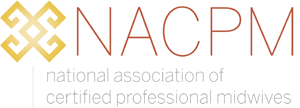
 The National Association of Certified Professional Midwives (NACPM) is applying for grant funding to support the creation of interstate compact agreements for midwifery licensure portability. While NACPM is applying for help through the Council of State Governments (CSG), if accepted, they will only provide technical assistance through Department of Defense (DoD) funding. NACPM requires additional support for this groundbreaking initiative. The project includes drafting model legislation, developing a legislative resource kit, and convening state policymakers, aiming to enhance occupational licensing mobility, increase healthcare access, and improve public health and safety. For more information visit https://www.nacpm.org/interstate-compact-agreement |
Allied Organizations Working Together Toward an Interstate Compact Agreement
NACPM believes that organizations, working together towards this goal, can make a significant impact on the landscape of midwifery care in the United States and Territory. By establishing an interstate compact agreement, we can collectively empower CPMs, improve access to quality midwifery care, and ultimately contribute to better health outcomes for clients and their families.
Benefits of an Interstate Compact Agreement for CPM Licensure
-
Enhanced Mobility and Workforce Flexibility: An interstate compact would allow CPMs licensed in one member state to practice in other member states without the need for additional licenses. This mobility is crucial, especially in addressing regional shortages of midwives and in responding to specific healthcare needs across state lines.
-
Standardization of Licensure Requirements: This agreement would lead to the standardization of licensure requirements, ensuring consistency in the quality and level of care provided by CPMs. It would facilitate a unified standard for education, training, and practice, enhancing the credibility and recognition of CPMs nationally.
-
Streamlined Licensing Process: By reducing redundant licensing processes, CPMs can save time and resources, making it easier for them to expand their practice to multiple states. This also means quicker access to midwifery care for families in different states.
-
Increased Access to Midwifery Care: With greater mobility and a streamlined licensing process, more families across the country will have access to midwifery care. This is particularly important in underserved areas or in states where there is a shortage of healthcare providers.
-
Collaboration and Best Practices: An interstate compact fosters a collaborative environment where states can share best practices, research, and resources, leading to overall improvements in midwifery care and maternal health outcomes.
-
Public Safety and Trust: Such agreements often include mechanisms for enhancing public safety, such as coordinated licensure information systems. This increases the ability to track and manage licensure, discipline, and practice information, thereby enhancing public trust in midwifery services.
-
Advocacy and Influence: A collective approach strengthens advocacy efforts for midwifery care at both state and national levels. It amplifies our voice in influencing birth health policies, funding, and research priorities.
If all the MEAC-accredited midwifery schools donated $75/student and required their students to become members the entire initiative could be funded. This effort directly impacts student access to NC-SARA states during clinical, and work sustainability and flexibility after graduation. This is where impact happens!
|
|